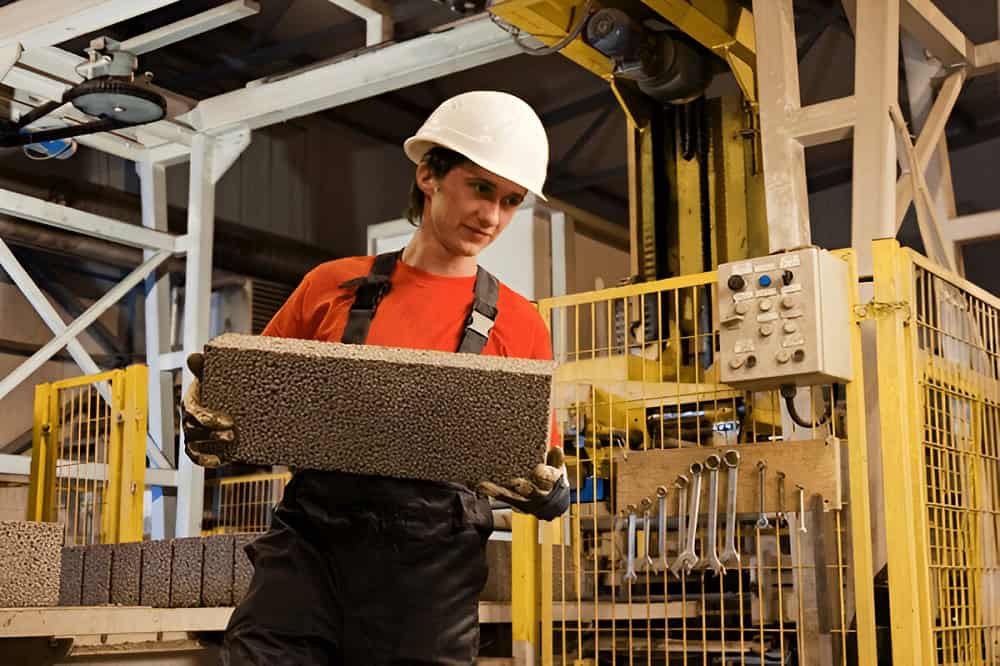
A cement block making machine is a powerful tool for producing concrete blocks used in construction. These machines are ideal for small businesses aiming to supply affordable, high-quality building materials to local builders and contractors.
If you’re looking to start or grow your small manufacturing business, understanding how a cement block making machine works can help you make the right investment.
What Is a Cement Block Making Machine?
A cement block making machine is equipment that forms concrete blocks by compressing a mix of cement, sand, aggregates, and water into specific shapes using moulds. These blocks are used in the construction of buildings, walls, pavements, and other infrastructure projects.
The machine simplifies and speeds up the block production process, ensuring consistent size, strength, and quality.
Types of Cement Block Making Machines
Depending on your budget, production needs, and space, there are different types of cement block making machines suitable for small businesses:
1. Manual Block Making Machine
- Operated by hand
- Low investment cost
- Produces fewer blocks per day
- Ideal for beginners or rural setups
2. Semi-Automatic Block Making Machine
- Uses a motor or vibrator for pressing blocks
- Faster and more efficient than manual machines
- Suitable for moderate production
3. Fully Automatic Block Making Machine
- Fully automated feeding, mixing, pressing, and ejecting process
- High-speed, high-volume production
- More suitable for larger-scale operations, but some compact models work for small businesses too
4. Mobile Block Making Machine
- Compact and movable
- Useful for on-site production
- Reduces transportation needs
Key Features of a Cement Block Making Machine
- Adjustable Moulds: Produce various block shapes and sizes.
- Vibration System: Ensures better compaction and durability.
- Hydraulic or Mechanical Operation: For high-pressure block formation.
- Energy Efficiency: Many models are designed to consume less power.
Benefits for Small Businesses
A cement block making machine offers several benefits for entrepreneurs and local manufacturers:
- Low Startup Cost: Manual or semi-automatic machines are affordable.
- Quick Returns: Blocks are always in demand, so selling them is easy.
- Scalable: You can start small and expand as your business grows.
- Easy to Operate: With basic training, anyone can use the machine.
- Custom Production: Make blocks of different sizes based on customer needs.
- Eco-Friendly: Many machines allow the use of industrial waste like fly ash or slag.
How to Start a Cement Block Business
Step 1: Choose the Right Machine
Start with a model that matches your budget and production goals. Manual and semi-auto machines are good for low to medium output.
Step 2: Secure a Small Area
You’ll need around 500–1000 square feet for production, drying, and storage.
Step 3: Source Raw Materials
You’ll need cement, sand, gravel or stone chips, and water. In some cases, you can use fly ash or construction waste.
Step 4: Train Workers
Train 2–4 workers on how to operate the machine safely and efficiently.
Step 5: Market Your Blocks
Sell your blocks to builders, contractors, hardware stores, or directly to end customers in your area.
Block Types You Can Produce
With a cement block making machine, small businesses can manufacture:
- Hollow Blocks: Lightweight and used for internal walls
- Solid Blocks: Stronger and used for load-bearing walls
- Paver Blocks: Used for footpaths, driveways, and outdoor areas
- Interlocking Blocks: Easy to assemble without mortar
Cost and Profitability
- A basic manual machine can cost ₹50,000 to ₹1.5 lakh.
- Semi-automatic models range from ₹2 lakh to ₹5 lakh.
- Production capacity varies from 300 to 1500+ blocks per day.
- Cement blocks are cheaper to make and sell well due to ongoing construction activity.
Your return on investment can be fast—often within a few months—if you target the right market and maintain quality.
Maintenance Tips
- Regularly clean the moulds and machine parts.
- Check the motor, belts, and vibration system often.
- Lubricate moving parts to reduce wear and tear.
- Train your staff to handle the machine properly to avoid breakdowns.
Final Thoughts
A cement block making machine is one of the best tools a small business can invest in for entering the construction materials industry. It offers high demand, low operating costs, and good profit margins. Whether you’re starting in a rural area or a developing urban zone, this machine can help you build a strong and successful business.




